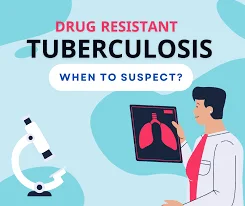 India is witnessing a sharp rise in cases of drug-resistant tuberculosis (TB), according to reports from health authorities. The increase in multi-drug-resistant TB (MDR-TB) cases, particularly in urban areas, is raising significant concerns about the growing resistance to standard TB treatments. Experts are warning that this trend could undermine the country’s progress in controlling one of its most prevalent infectious diseases.
India is witnessing a sharp rise in cases of drug-resistant tuberculosis (TB), according to reports from health authorities. The increase in multi-drug-resistant TB (MDR-TB) cases, particularly in urban areas, is raising significant concerns about the growing resistance to standard TB treatments. Experts are warning that this trend could undermine the country’s progress in controlling one of its most prevalent infectious diseases.
Tuberculosis, a bacterial infection that primarily affects the lungs, remains a leading cause of death in India, which accounts for more than 25% of the global TB burden. While most cases can be treated with a standard six-month course of antibiotics, the emergence of drug-resistant TB strains poses a serious threat to public health.
MDR-TB occurs when TB bacteria become resistant to at least two of the most effective first-line drugs, isoniazid and rifampicin. Treating MDR-TB requires longer and more complex therapies, often with more severe side effects. In recent years, there has also been an increase in extensively drug-resistant TB (XDR-TB), which is resistant to even more drugs, making it harder to treat.
Dr. Rajni Kant, a senior official at the Indian Council of Medical Research (ICMR), stated that the surge in drug-resistant TB cases is partly due to incomplete or improper treatment of TB patients, allowing the bacteria to develop resistance. “The rise in MDR-TB is a major setback for our TB eradication efforts. We need to ensure patients complete their full treatment course to prevent drug resistance,” he said.
India has launched several initiatives in recent years to combat TB, including the National Strategic Plan for TB Elimination and the introduction of new diagnostic tools and drugs. However, the growing incidence of drug-resistant strains requires more targeted interventions, such as strengthening TB surveillance, improving treatment adherence, and ensuring the availability of second-line treatments.
The World Health Organization (WHO) has also expressed concern over the global rise in drug-resistant TB, emphasizing the need for countries to invest in research and development of new antibiotics.
Efforts to curb the spread of drug-resistant TB in India will require coordinated action from both the government and the healthcare sector, with an urgent focus on early diagnosis, treatment adherence, and public awareness.






















